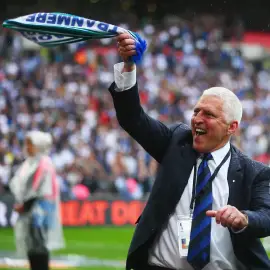The California Lawyer Who Saved Tranmere Rovers and Paved the Way for Foreign Ownership in Football
In the glitzy world of modern football, where billionaire investors from around the world vie for ownership of prestigious English soccer clubs, it is easy to forget the modest beginnings of foreign ownership in the sport. Back in 1984, when the game was at its nadir, a California lawyer named Bruce Osterman made an audacious move that would forever change the landscape of English football. Little did he know that his investment in a struggling and impoverished club, Tranmere Rovers, would mark the first step towards today’s globalized era of football ownership.

Tranmere Rovers, a team located in the unemployment-lashed north of England, was on the brink of extinction in the early 1980s. With low attendance, hooliganism, and a complete lack of investment, the club represented the dire state of the entire industry at the time. But hope emerged when Bruce Osterman, a keen amateur goalkeeper and an unlikely football enthusiast, decided to rescue the struggling club with his own money.
“I was young, and it seemed like a good idea,” recalls Osterman, now in his late 70s, reflecting on his decision to invest in a faraway sports team. “Tranmere was in real trouble, so it was a number I could afford.”
His acquisition of the club set a precedent, becoming the first instance of foreign ownership in English football, long before the likes of Roman Abramovich and other international moguls entered the scene. Osterman’s passion for the sport and his commitment to the club were evident as he traveled across the Atlantic periodically to oversee the operations, despite occasional language barriers with the local Merseyside accent.

But Osterman’s foreign ownership was not without its challenges. Football at the time was more insular, and English clubs were banned from European competitions due to hooliganism. Osterman’s venture into English football was seen as novel and even quirky, with journalists amused by the bespectacled chairman diving around in the training field mud while players playfully shot balls at him. Nevertheless, Tranmere Rovers were saved from the brink, thanks to Osterman’s investment and the shrewd managerial decisions of player-manager Frank Worthington.
The club’s roller-coaster journey continued, with ups and downs, and a change of ownership occurred in 1987 when Osterman sold the club, albeit at a loss. However, the story of foreign ownership did not end there. In 2015, Tranmere Rovers faced another crisis, but this time a familiar face returned to the rescue – Mark Palios, a former player and businessman with a knack for turning around failing businesses.
Palios and his wife Nicola purchased the club, following a three-step process that involved finding cash for breathing space, fixing the business, and bringing in new investment. The couple worked diligently to break the cycle of reliance on saviors and benefactors, developing new revenue streams and focusing on the club’s standing in the community.
Today, Tranmere Rovers is eyeing a new stadium as part of the Wirral Waters dockland regeneration scheme, a testament to the club’s resilience and ambition under foreign ownership. Mark Palios envisions leveraging the area’s rich footballing heritage for potential projects, all while staying true to his football-agnostic business model.
The story of Tranmere Rovers and its foreign ownership marks a turning point in football history. It paved the way for the influx of international investors who now vie for ownership of some of England’s most illustrious clubs. While modern ownership can sometimes be seen as profit-driven and controversial, the roots of foreign ownership lie in the passion and adventure of a California lawyer who dared to invest in a struggling English football club.

As the global football landscape continues to evolve, Tranmere Rovers will forever remain a symbol of how passion and business intertwine in the world’s most popular sport. Bruce Osterman’s adventure may have been unconventional, but it set the stage for a global gamechanger – the first foreign owner in football history. The ripples of his decision are felt to this day, as football clubs around the world attract megarich investors from all corners of the globe. From Tranmere’s dark days of the 1980s to its potential bright future under Mark Palios, the club’s story exemplifies the enduring allure of football and its power to bring together business and passion in equal measure.
In conclusion, the tale of Tranmere Rovers and its pioneering foreign owner serves as a reminder that football is not just a game – it is a global phenomenon that transcends borders, cultures, and languages. Bruce Osterman’s bold move from California to England opened the floodgates for international investment in English football, forever changing the sport’s dynamics. As football clubs continue to be sought-after assets by billionaires and entertainment empires, it is crucial to remember the humble origins of foreign ownership and the unlikely story of Tranmere Rovers, the club that kick-started a global revolution in the beautiful game.







